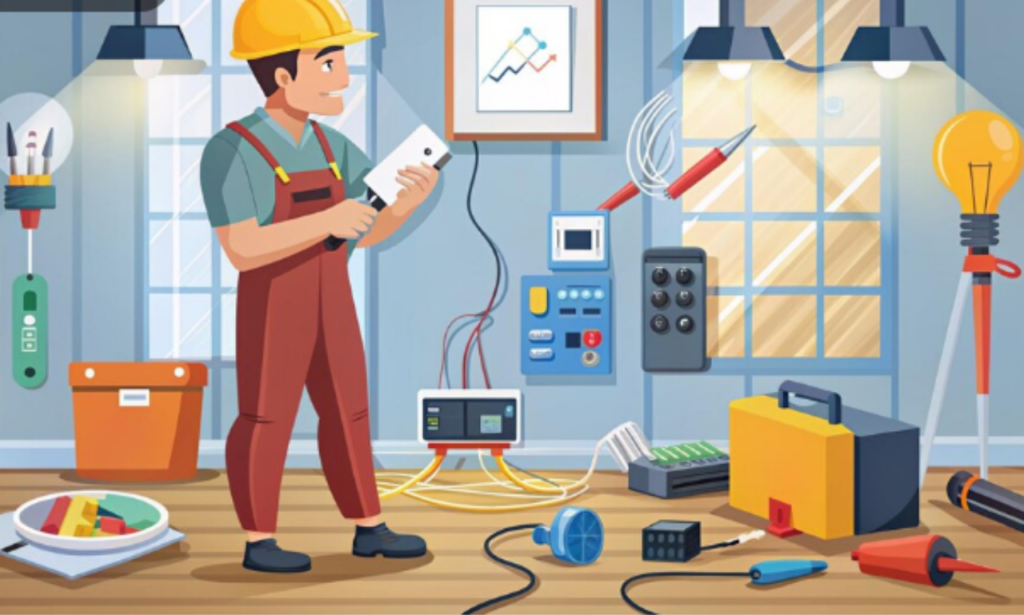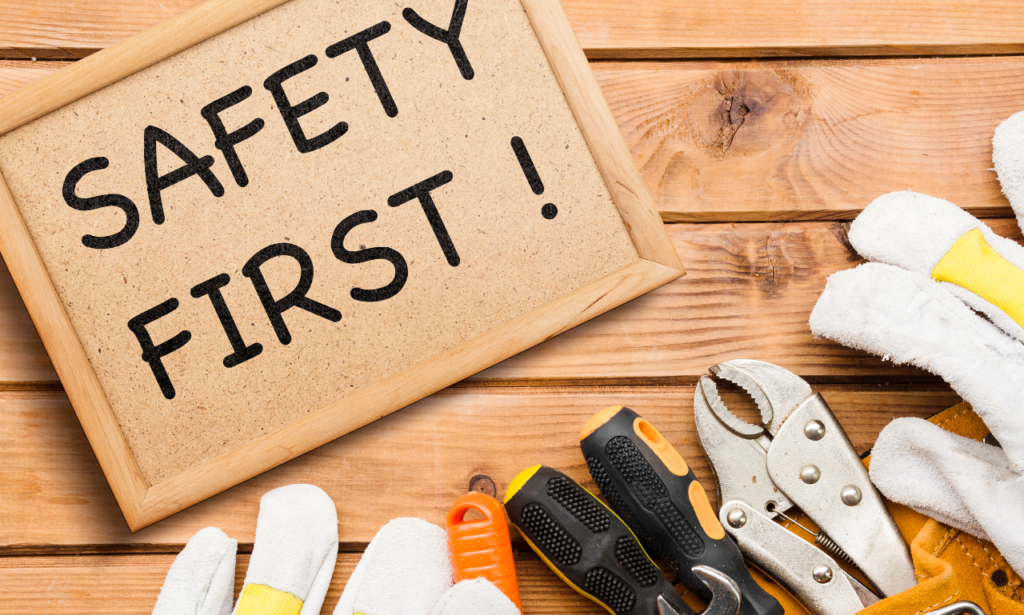Electrical safety is something that should never be taken lightly. Every year, thousands of home fires, injuries, and even fatalities occur due to electrical hazards. Fortunately, by following some simple electrical safety tips, you can protect your home and loved ones from these dangers.
This comprehensive guide will explore 10 essential electrical safety tips for your home. Each tip is designed to help you identify potential risks, take preventative measures, and ensure that your electrical systems function safely and efficiently.
- Why Electrical Safety at Home Matters
- 1. Regularly Inspect Electrical Cords and Plugs
- 2. Keep Electrical Devices Away from Water
- 3. Unplug Unused Appliances
- 4. Use the Correct Wattage for Light Bulbs
- 5. Install Childproof Outlets
- 6. Avoid Running Cords Under Rugs or Furniture
- 7. Don’t Attempt DIY Electrical Work
- 8. Regularly Test Your Circuit Breakers
- 9. Install Surge Protectors
- 10. Educate Your Family About Electrical Safety
- Final Thoughts on Electrical Safety at Home
Why Electrical Safety at Home Matters
Your home has electrical devices—from major appliances like refrigerators and ovens to smaller gadgets like chargers and lamps. While these devices make life more convenient, they also pose risks if not used or maintained properly. Electrical safety is about preventing these risks and creating a safe living environment for everyone in your home.
Understanding the importance of electrical safety is the first step in protecting your home. Now, let’s dive into the 10 essential tips that every homeowner should follow.
1. Regularly Inspect Electrical Cords and Plugs
Look for Signs of Wear and Tear
Electrical cords and plugs are often overlooked, but they are a common source of electrical hazards. Over time, cords can become frayed, and plugs can become damaged. This wear and tear can expose live wires, leading to electrical shocks or even fires.
- Inspect all electrical cords regularly, especially those in high-traffic areas like living rooms and kitchens.
- If you notice any fraying, exposed wires, or other damage, replace the cord or plug immediately.
Avoid Overloading Outlets
Another common issue is overloading electrical outlets by plugging in too many devices at once. This can cause the outlet to overheat, leading to a fire.
- Use power strips with built-in surge protection to safely manage multiple devices.
- Never plug high-wattage appliances, like space heaters or hairdryers, into the same outlet as other devices.
2. Keep Electrical Devices Away from Water
The Danger of Water and Electricity
Water and electricity are a dangerous combination. Electrical devices exposed to water can cause shocks, electrocution, or fires. It’s crucial to keep all electrical appliances and outlets away from water sources like sinks, bathtubs, and outdoor areas.
- Install GFCI outlets in areas where water and electricity might come into contact, such as bathrooms, kitchens, and outdoor spaces. These outlets are designed to shut off power if they detect moisture.
- Dry your hands thoroughly before using any electrical device.
Proper Use of Outdoor Electrical Devices
When using electrical devices outdoors, take extra precautions.
- Use weatherproof covers on all outdoor outlets.
- Ensure that all outdoor extension cords and devices are rated for outdoor use.
3. Unplug Unused Appliances
Why Unplugging Matters
Leaving appliances plugged in when they’re not in use can be a fire hazard, especially if the appliance malfunctions. Additionally, plugged-in appliances continue to draw power, which can increase your electricity bill.
- Unplug small appliances like toasters, coffee makers, and chargers when they’re not in use.
- For larger appliances that are harder to unplug, consider using a smart plug that allows you to cut off power remotely.
Energy Savings and Safety
By unplugging unused appliances, you not only reduce the risk of electrical fires but also save on energy costs.
- Consider energy-efficient appliances that automatically shut off when not in use.
4. Use the Correct Wattage for Light Bulbs
The Importance of Correct Wattage
Using the wrong wattage for light bulbs can cause the bulb to overheat, increasing the risk of fire. Always check the recommended wattage for your light fixtures.
- Match the bulb wattage to the fixture’s rating. If a fixture is rated for 60 watts, don’t use a 100-watt bulb.
- Consider switching to LED bulbs, which are more energy-efficient and produce less heat.
Avoiding Common Mistakes
It’s easy to accidentally use the wrong bulb if you’re in a hurry or don’t have the correct one on hand.
- Label your fixtures with the correct wattage to prevent mistakes.
- Stock up on the right bulbs so you always have them on hand.
5. Install Childproof Outlets
Protecting Your Children
Children are naturally curious and might be tempted to stick objects into electrical outlets. This can result in serious injury or even death. Childproof outlets are a simple solution to this problem.
- Install tamper-resistant outlets (TROs), which have built-in shutters that block foreign objects.
- Use outlet covers on all accessible outlets, especially in areas where children play.
Teaching Electrical Safety
In addition to installing safety devices, it’s important to teach your children about electrical safety.
- Explain the dangers of electricity in simple terms.
- Show them how to use electrical devices safely and supervise them closely.
6. Avoid Running Cords Under Rugs or Furniture
The Hidden Dangers
Running electrical cords under rugs or furniture may seem like a convenient way to keep them out of sight, but it’s a significant safety hazard. The weight of furniture can damage the cord, and heat buildup under rugs can lead to fires.
- Keep cords visible and out in the open.
- If you need to run a cord across a room, use cord covers designed for that purpose.
Proper Cord Management
Properly managing your cords not only enhances safety but also helps to prevent tripping hazards.
- Use cable organizers or clips to keep cords tidy and off the floor.
- Label your cords to avoid confusion and reduce the risk of overloading outlets.
7. Don’t Attempt DIY Electrical Work
Leave It to the Professionals
While DIY projects can be fun and cost-effective, electrical work is one area where you should always call in the professionals. Improper wiring, faulty installations, and incorrect repairs can lead to electrical fires, shocks, or even death.
- Hire a licensed electrician for any electrical work, no matter how small the job may seem.
- If you’re unsure about an electrical issue, don’t attempt to fix it yourself—always seek professional help.
Understanding When to Call for Help
It’s essential to recognize when an electrical problem is beyond your expertise.
- Flickering lights, tripped breakers, and sparking outlets are signs that you need professional assistance.
- Don’t wait until it’s too late—address electrical issues as soon as they arise.
8. Regularly Test Your Circuit Breakers
The Role of Circuit Breakers
Your home’s circuit breakers are designed to shut off power in the event of an overload, preventing electrical fires. However, circuit breakers can wear out over time, so it’s important to test them regularly to ensure they’re functioning correctly.
- Test your circuit breakers every few months by flipping them on and off.
- If a breaker frequently trips, it could be a sign of a larger issue—contact an electrician to investigate further.
Upgrading Your Electrical Panel
If your home has an older electrical panel, it may be time for an upgrade.
- Modern circuit breakers are more reliable and offer better protection than older models.
- Consider upgrading to a smart electrical panel that allows you to monitor your home’s electrical system remotely.
9. Install Surge Protectors
Protecting Your Devices
Power surges can damage or destroy your electrical devices, leading to costly repairs or replacements. Surge protectors are an easy and effective way to protect your electronics from unexpected power spikes.
- Use surge protectors for all sensitive electronics, such as computers, TVs, and gaming consoles.
- Consider installing a whole-house surge protector for added protection.
Choosing the Right Surge Protector
Not all surge protectors are created equal. It’s important to choose one that offers the right level of protection for your needs.
- Look for surge protectors with a high joule rating—this indicates how much energy the device can absorb before it fails.
- Consider surge protectors with built-in USB ports for added convenience.
10. Educate Your Family About Electrical Safety
The Power of Knowledge
Ensuring electrical safety in your home isn’t just about following the right practices—it’s also about making sure everyone in your household understands the risks and how to avoid them.
- Hold regular family meetings to discuss electrical safety tips.
- Teach children about the dangers of electricity in age-appropriate ways.
Creating a Safe Environment
By educating your family, you create a culture of safety that extends beyond just electrical hazards.
- Encourage everyone to report electrical issues immediately, no matter how minor they seem.
- Regularly review and update your home’s safety practices to keep up with new technologies and potential risks.
Final Thoughts on Electrical Safety at Home
Electrical safety is something that should never be overlooked. By following these 10 electrical safety tips, you can create a safer living environment for yourself and your loved ones. Remember, regular maintenance and professional assistance are key to preventing accidents and ensuring your home’s electrical systems are functioning properly.
Don’t take chances with electrical safety—invest in quality products, hire professionals when needed, and stay informed about the best practices for keeping your home safe.
For more in-depth information on electrical safety and other home maintenance tips, check out our recommended resources. Your family’s safety is worth every effort
, so start implementing these tips today and enjoy peace of mind in your well-protected home.
- Life Style Cool Shit Project: Redefine Your Space at LifeStyledCo - January 6, 2025
- Picuki: Your Gateway to Accessing Instagram’s Exclusive Content - December 31, 2024
- 5 Attractive Places to Visit in Abha, Saudi Arabia - December 18, 2024



